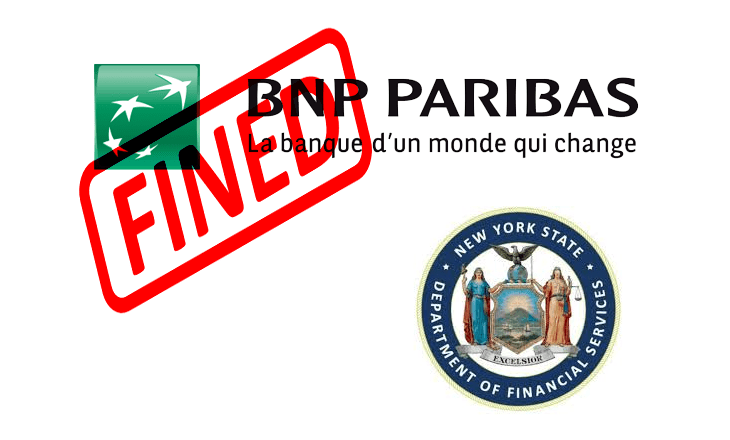French bank BNP Paribas (BNPP) has today been struck with a $350 million USD fine by New York State’s banking regulator. The bank is being held responsible for its Foreign Exchange “Cartel” manipulating foreign exchange rates, engaging in collusion, executing fake trades, coordinating trades to enhance profits at customers’ expense, and improperly sharing confidential customer info for many years.
New York’s Department of Financial Services (DFS) directed the bank to improve management oversight, risk management policies and procedures.
BNPP operates in the United States through its BNP Paribas S.A., New York branch, which is supervised and regulated by the Department of Financial Services as a licensed foreign bank branch in New York State.
DFS Superintendent Maria T. Vullo officially announced that BNP Paribas S.A. (BNPP) and its New York branch will pay a $350 million fine as part of a consent order entered into with the New York State Department of Financial Services (DFS) for significant, long-term violations of New York banking law arising out of the Bank’s global foreign-exchange business. The violations announced today include major deficiencies in the Bank’s oversight that allowed nearly unfettered misconduct by more than a dozen BNPP traders and salespeople.

Maria T. Vullo
DFS Superintendent Vullo said:
Participants in the foreign exchange market rely on a transparent and fair market to ensure competitive prices for their trades for all participants. Here the Bank paid little or no attention to the supervision of its foreign exchange trading business, allowing BNPP traders and others to violate New York State law over the course of many years and repeatedly abused the trust of their customers. DFS appreciates the Bank’s cooperation in resolving this matter and for the remedial measures taken to address some of the misconduct arising within the Bank’s FX Trading Business in connection with our investigation.
Under the DFS consent order, BNPP will submit plans to improve senior management oversight of the company’s compliance with New York State laws and regulations relating to the company’s foreign exchange trading business.
The Bank will also enhance internal controls and risk management, and improve its compliance risk management program with regard to compliance by BNPP with New York laws and regulations with respect to its foreign-exchange trading business across the firm. The Bank also has taken disciplinary action against a number of employees involved in the misconduct, including firing several employees, and has agreed not to re-employ such employees in the future.
The subject misconduct, which lasted from 2007 to 2013, involved at least a dozen BNPP employees in New York and other key foreign exchange trading hubs, including London and Tokyo, all of whom have either been terminated, resigned or otherwise disciplined. DFS’s investigation found that for many years, a number of foreign exchange traders participated in multi-party chat rooms where they engaged in a variety of misconduct, including:
- Collusive conduct carried out through on-line chat rooms that involved fake trades designed to manipulate prices; collusion in setting spreads for customers trading in certain currencies, in order to widen the spreads and artificially increase profits;
- Improperly exchanging information about past and impending customer trades in order to maximize profits at customers’ expense. Conduct included improper sharing of confidential customer information via personal e-mail – including through use of a sophisticated codebook that helped identify dozens of clients, central banks or important market participants and specified trading volumes;
- Manipulation of the price at which daily benchmark rates were set – both from collusive market activity and improper submissions to benchmark-fixing bodies; and
- Misleading customers by hiding markups on executed trades, including by using secretive hand signals when customers were on the phone; or by deliberately “underfilling” a customer trades, in order to keep part of a profitable trade for the Bank’s own book.
DETAILS
The DFS investigation found that a trader then located in BNPP’s New York branch employed a variety of schemes to manipulate prices and spreads in several currencies, including the South African rand, Hungarian forint and Turkish lira. The trader explicitly labeled the group a “cartel,” in his chats, and called the group of traders that were colluding with him to manipulate the price of the South African rand, “ZAR Domination,” after the rand’s trading symbol, which is “Zar.” One of the strategies employed by “ZAR Domination” involved pushing the rand’s price up during New York trading hours, when trading was less liquid, and thereby to depress competition by widening the currency’s spread to increase the Bank’s profitability.
The BNPP trader involved in manipulating rand prices also partnered with colleagues at other large banks to influence foreign exchange rates by conducting fake trades during the overnight hours of the currencies’ local time zones that caused the prices to spike upward or downward. In many instances, these trades were unwound or canceled within seconds of being placed.
BNPP traders also improperly exchanged confidential customer with traders at other banks, again in chat rooms, to unfairly profit at these customers’ expense. For example, traders adjusted their own prices in light of the extra information gleaned from their supposed competitors about the prices they were offering customers.
DFS’ investigation also uncovered efforts by BNPP traders to conceal information. For example, one BNPP trader on the Bank’s Tokyo trading desk joined with seven other traders located at various global banks and corporations to improperly share customer information in the trading of yen. This illicit group developed an elaborate codebook, called “We Reign,” to share information secretly. To further avoid detection, group members went so far as to use their personal e-mail to distribute the secret codebook.
Finally, the DFS investigation also discovered that the firm’s “last look” functionality in its electronic trading system trade acceptance process improperly disadvantaged customers, without sufficiently disclosing to them how the Bank’s electronic trading was conducted.
A copy of the consent order can be found here.
